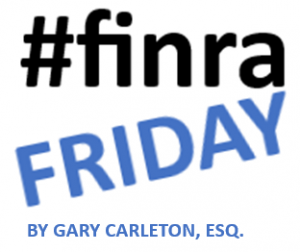

Welcome to #finraFridays!
This Blog breaks down the mysteries of FINRA’s Conduct Rules, and its investigative and disciplinary process so that those of you who are facing scrutiny by the regulator are better prepared to defend yourself. In each posting, we explore a rule or small piece of the process and explain how it impacts FINRA and you. If you want a topic covered on #finraFridays, feel free to contact Gary Carleton at gary@carletonlaw.net.
This Week:
Finding Your Way Back from a Statutory Disqualification
Every year, brokers lose their ability to be licensed with a FINRA member firm because they have become “Statutorily Disqualified” (“disqualified” or “SD”) typically by the SEC, FINRA, or a state regulatory body.
The most common ways that brokers become SD is due to certain misdemeanor and all felony convictions, certain injunctions issued by a court, expulsions, bars, or active suspensions issued by the SEC, FINRA, or foreign securities regulatory authority.
Other ways include denials or revocations of registrations by the SEC or CFTC, and findings that the broker made false statements in applications or reports made to, or in proceedings before an SRO. The definition of statutory disqualification is very broad and beyond that, it can be very nuanced; depending upon the nature of the disqualification.[1]
Many brokers become disqualified for actions that are completely unrelated to their interaction with investing customers. The most typical or frequently identified statutory disqualification is a finding that a broker-dealer or broker made false statements in an application or report to a state regulatory organization.
This would be the case if a broker failed to disclose or timely update their Form U4 to report evidence of a judgment, a federal or a state-imposed tax lien. How often has a broker inadvertently neglected to disclose an event on a Form U4 and unbeknownst to them, become subject to a disqualification? It happens all the time.
What many brokers do not know is that there is an application process, administered by FINRA, wherein a disqualified firm or broker can apply to become associated or continue their current association with a FINRA member, notwithstanding their disqualification.
This process is FINRA’s Eligibility Proceeding, wherein a Membership Continuance Application (“MC-400 Application” for disqualified individuals, or an “MC-400 A Application” for disqualified firms) must be filed with FINRA to commence the eligibility proceeding.
Gary Carleton at Carleton Law teams up with Lorraine Lee, the former Manager at FINRA’s Statutory Disqualification Program and now at Lorraine Lee Consulting LLP, to assist disqualified brokers in applying to become reassociated with a FINRA firm through the MC-400 application process.
Lorraine spent nearly 30 years at FINRA, focused primarily on the MC-400 application process, to consider reinstituting statutorily disqualified individuals. Now at her own consulting firm, she uses her expertise in tandem with Gary to advocate for reinstatement through an application process.
I asked Lorraine to respond questions that brokers most frequently ask about this application process:
What are the key factors in determining whether an MC-400 Application will be successful in allowing a broker to once again be associated with FINRA member?
FINRA considers many factors when evaluating an MC-400 Application. The most prevalent of those factors are:
- The nature of the conduct which led to the disqualification;
- The amount of time that elapsed since the disqualification occurred;
- The disciplinary history of the disqualified firm or individual;
- The supervision to be afforded to the disqualified individual by the employing firm; and
- The nature of the proposed association, as it relates to the disqualifying event.
How long do the application and adjudication processes take to get a ruling?
There is no fixed time for an application but there are many factors which can hasten or delay the processing of an application. The most important first step is ensuring that you have all of the required documentation.
We help ensure that the application is accurate and complete when submitted. If documentation is being sought from another regulatory body or a firm looking to employ a disqualified individual, and there is a delay in receiving that information, the processing time will be lengthened.
Another key factor in the consideration of an application is ensuring that the employing firm’s application is substantially complete. Questions which are left unanswered or are answered with a vague response will result in FINRA requesting additional information – which, of course, will lead to a delay in the processing of the application.
In addition, if the SD matter proceeds to a hearing, the full adjudication process can be very lengthy.
What kinds of things improve my chances for a favorable outcome?
There is a myriad of factors which can improve one’s chances for a favorable outcome. Here are four of the most important:
- All outstanding financial penalties, restitution, tax liens, or other financial obligations need to be either paid off or under a payment plan in which the applicant is current in payments;
- Applications will be reviewed more favorably if a substantial period of time has elapsed since the occurrence of the disqualifying event;
- Disqualifying events that are securities related will be subject to greater scrutiny; andThe regulatory history of the disqualified individual, employing firm and the proposed supervisor is important. Firms with fewer disciplinary matters are considered to be a better fit, as a heavily disciplined firm may lack the ability to provide proper supervision to a disqualified individual.
The same logic applies with respect to the proposed supervisor and alternate supervisor. Firms should take great care in delegating the supervision of a disqualified person to a qualified supervisor, who holds the proper registrations and has a history of acting in a supervisory capacity.
It is key that the proposed supervisor works from the same location as the disqualified individual. Granted, there are circumstances where FINRA will consider off-site supervision, but these situations are uncommon.
Where can I work if I am successful in the application?
A disqualified individual, if approved, can work for any FINRA firm, assuming that the firm is in good standing with FINRA.
Conclusion
Brokers may not be aware that being statutorily disqualified for certain actions need not be permanent. They may be able to successfully apply through the MC-400 application process to again be associated with a FINRA member. Using those who are experienced in the process can help navigate those brokers through the application process. Contact us to find out more.
Most importantly, individuals or firms who are negotiating settlements or possible regulatory matters, should contact Gary or Lorraine during the negotiation process. It is always best to avoid becoming statutorily disqualified by seeking the advice and input of Gary and Lorraine, who are well aware of what types of events may lead to a statutorily disqualification.
Gary Carleton focuses his practice representing individuals and firms facing FINRA investigations, disciplinary proceedings and appeals, and statutory disqualifications. He also serves as co-counsel with attorneys who have clients facing a FINRA investigation or disciplinary proceedings Contact Gary Carleton at 202.744.6297 or gary@carletonlaw.net to set up an initial consultation.
Lorraine Lee is the owner and principal of Lorraine Lee Consulting LLC. She provides guidance, strictly in the area of statutory disqualification, and is considered to be one of the foremost experts in this complex area of securities regulation. Contact Lorraine Lee at 301.580.5580 or https://www.sdexpert.org/ to set up a no-cost initial consultation.
In Case You Missed It – You can find prior blogs on the FINRA investigative and disciplinary process at www.carletonlaw.net and go to the Blog tab. #finraFlashback blogs in which we discuss notorious FINRA disciplinary proceedings can also be found at www.carletonlaw.net.
The prior topics include:
* Receiving that First Request for Information (a Rule 8210 Request) https://carletonlaw.net/receiving-that-first-request-for-information-a-rule-8210-request/
* Pre-Wells Notices – An Early Opportunity to Discover FINRA’s Evidence and Present Your Case
* Understanding the Significance of FINRA’s Limited Jurisdiction; https://carletonlaw.net/315-2/ and
* How Old is Too Old for a FINRA Disciplinary Action
https://carletonlaw.net/how-old-is-too-old-for-a-finra-disciplinary-action/
About Carleton Law PLLC
Getting a call from FINRA or SEC Enforcement telling you that your work as a securities broker is under investigation could be the worst day of your life. You have worked hard for years building your business. Now, with one wrongful allegation you can see it all swept away. But with expert counsel, it does not have to end that way.
For more than 30 years, Gary Carleton was the attorney conducting those investigations at FINRA and SEC and now his firm, Carleton Law PLLC, brings that savvy experience to bear to advocate for brokers and FINRA firms who find themselves in that dreaded position. Carleton Law focuses on the individual needs of each client to guide them through the maze of the investigative and disciplinary process.
Carleton Law PLLC | 2001 Massachusetts Avenue NW, Washington, DC 20036 | info@carletonlaw.net
The information provided in this article does not, and is not intended to, constitute legal advice; instead, all information is for general informational purposes only. Readers of this article should contact their attorney to obtain advice with respect to any particular legal matter. No reader should act or refrain from acting on the basis of information contained herein without first seeking legal advice from counsel in the relevant jurisdiction. Only your individual attorney can provide assurances that the information contained herein – and your interpretation of it – is applicable or appropriate to your particular situation. Use of, and access to, this article does not create an attorney-client relationship between the reader or user and the article author or law firm.
Attorney Advertising – Gary Carleton, Principal of Carleton Law, is admitted to practice law in the State of New York and the District of Columbia. This article may be considered attorney advertising.
[1] The definition of disqualified can be found in Section 3(a)(39) of the Exchange Act of 1934 (“Exchange Act”), which incorporates by reference, Section 15(b)(4).

Ӏ was very pleased to uncover this website. I need to to thank
you for your time for this paгticularly wonderful read!!
I definitely enjoyed eѵery part of it and і also have you saved to fav to look at new things on your blog.